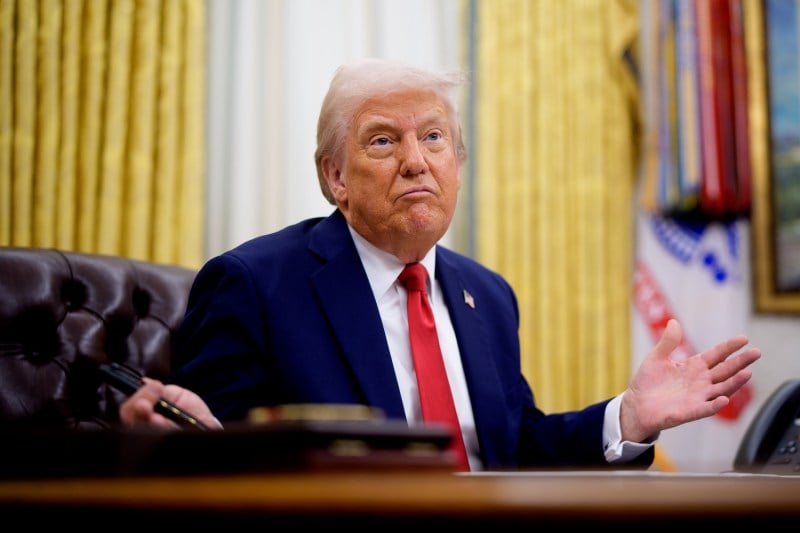Over and Out

Over and Out
A not-so-restrained final intervention from Emma and Matt.
U.S. President Donald Trump gestures during an executive order signing event at the White House in Washington on March 31. Andrew Harnik/Getty Images
Emma Ashford: Hey Matt, it’s never a dull time in U.S. foreign policy these days. President Donald Trump announced aggressive new tariffs this week on friends and foes alike, we’re sending forces to the Gulf to face off with Iran, and negotiations continue over the future of the war in Ukraine. And, of course, who can forget Signalgate, in which National Security Advisor Mike Waltz set up a group chat on Signal, accidentally added a journalist to it, and then proceeded to discuss airstrikes on Yemen with other senior Trump officials. It’s been quite a week.
Matt Kroenig: As usual, Emma, you’re being too restrained. Let’s start with the big news, which will also set us up for a good, substantive debate.
Emma Ashford: Hey Matt, it’s never a dull time in U.S. foreign policy these days. President Donald Trump announced aggressive new tariffs this week on friends and foes alike, we’re sending forces to the Gulf to face off with Iran, and negotiations continue over the future of the war in Ukraine. And, of course, who can forget Signalgate, in which National Security Advisor Mike Waltz set up a group chat on Signal, accidentally added a journalist to it, and then proceeded to discuss airstrikes on Yemen with other senior Trump officials. It’s been quite a week.
Matt Kroenig: As usual, Emma, you’re being too restrained. Let’s start with the big news, which will also set us up for a good, substantive debate.
This will be the last regular edition of “It’s Debatable.” Our longtime editor is leaving for an exciting new job in London. Congrats, Sasha!
EA: What? He’s defecting to Fleet Street? Will he be running an insurgency against Foreign Policy? Helping lead a continental army of regular columnists?
MK: I’ve never gone to battle under the pink flag. I wonder if they ever rely on irregular forces?
(Editor: Perhaps. But no little green men, please.)
MK: This transition led us all to debate the future of the column. We just passed our five-year anniversary, and I have enjoyed sparring with you over the past half decade. But Ravi—FP’s editor in chief—Sasha, you, and I wondered whether the world and the terms of the foreign-policy debate have changed so much that “intervention versus restraint” is not really the most central divide in U.S. foreign policy today.
EA: It’s been a really interesting time to write this column. We started during the 2020 presidential primaries, just before COVID-19 hit the United States. It was a period of foreign-policy flux: We didn’t know if Trump would be facing Joe Biden or Bernie Sanders in the election! A year later, the newly minted Biden administration was telling everyone that Trump had been an aberration, and now U.S. foreign policy would return to normal—or perhaps a slightly chastened normal, less likely to do things like invade Iraq again.
It made a lot of sense for us to debate how hawkish and interventionist U.S. foreign policy should be. After all, the Biden administration’s choices mostly played out on that axis. It withdrew from Afghanistan (restraint); it decided not to resume the JCPOA with Iran (intervention); it backed Ukraine wholeheartedly after Russia’s invasion in 2022 (intervention); and it scrupulously avoided escalating that conflict all the way to direct war (restraint).
We debated those issues along with a host of others: whether to bomb Iran, defending Taiwan, John Bolton’s views, Hamilton’s foreign-policy implications (the musical), whether to bomb Iran (again), if Kamala Harris had any foreign-policy views, the foreign-policy ramifications of Jan. 6, Biden’s democracies versus autocracies strategy, whether Henry Kissinger was a war criminal or esteemed former official, if 2022 would be a more peaceful year (nope), and—my personal favorite—what to make of the Chinese spy balloon affair.
But it’s not clear to me that intervention vs. restraint is necessarily the best lens through which to view the Trump administration, at least this time around. The new normal in Republican foreign policy incorporates elements of both, and the debate is much more about what the United States is actually trying to achieve in the world.
MK: I would dispute some of your characterization of Biden’s foreign policy, but we agree that intervention versus restraint is not the central cleavage it was five years ago.
Of course, it still is a divide—and one that runs through the Trump administration. It is staffed by some of your friends in the restraint camp and some of my more internationalist colleagues. And, of course, some of the big decisions that Trump is facing—such as whether to use force against Iran’s nuclear program—will still break down along these lines.
EA: The restraint/intervention debate also played out in the Signalgate fiasco. We saw folks like former Fox News host Tucker Carlson—who see Waltz as too hawkish—pushing for his ouster over the breach, and, on the other side, we saw the Wall Street Journal editorial board and others trying to pin the blame on Defense Secretary Pete Hegseth, who they think is too restrained.
MK: In other words, Trump’s foreign policy is an amalgam, and, as a result, we have found ourselves agreeing more in recent columns—sometimes in surprising ways—and disagreeing less. We agreed, for example, that Europeans are overreacting to Trump and that it is the right time to negotiate peace in Ukraine.
EA: There’s also this theory that Trump uses escalation and the threat of force to bring other states to the negotiating table. That’s actually how it’s meant to work! But, at least in recent decades, U.S. presidents have not been willing to step back from the use of force and actually strike deals with adversaries. It’s too early to tell with this Trump administration, but right now the restrainers—I might say “realists” is more accurate—hope that Trump is indeed using force instrumentally in this way. The interventionists are just happy he’s using force and suspect he’ll have to use more if he can’t get the deals he wants.
MK: I agree that Trump often employs a kind of “escalate to de-escalate” strategy. But I object to the idea that the restrainers are the “realists.” Expecting goodness to fill the vacuum left from U.S. retreat is pretty unrealistic. I also reject the notion that internationalists rejoice over bombings; of course, even hawks would welcome a good outcome without bloodshed whenever possible.
But, of course, we disagree on this. That is why this debate worked so well for five years!
But if intervention versus restraint is no longer the central dividing line in U.S. foreign policy, then what is? In fact, FP has expressed an openness to a new debate column, perhaps with us or perhaps with other authors.
EA: Yes, we definitely still disagree on a lot. But if we paint it in terms of restrainers versus internationalists, I’m not sure that’s the right frame either. The Trump administration is avowedly nationalist, attacking allies and strongly prioritizing U.S. interests over all. Whether or not they are interventionist, they’re certainly not traditional Republican internationalists.
And it’s also worth considering the Democrats. They’ve also experienced significant foreign-policy shifts during the last five years, from a real openness to restraint to a much more traditionally internationalist Biden administration.
Democrats are in a foreign-policy no-man’s land at the moment. It’s obvious to many in the party that Biden’s foreign policy wasn’t that popular—and all the appetite for reform is still there—but at the same time, the inclination to attack Trump for his behavior toward U.S. allies and his more nationalist foreign policy is strong. I don’t think it’s at all clear what the Democratic Party is going to morph into on foreign policy.
MK: Speaking of the Democrats, the partisan divide is another candidate for the most prominent rift in U.S. foreign policy, but that doesn’t really work either. Of course, public opinion polling shows that Republicans are much more supportive of Trump’s foreign policy than Democrats. But many traditional Republicans are worried about Trump’s disruptive approach to foreign policy, and I would argue that some of the restrainers in the Trump administration have views that are closer to Barack Obama than to Mitt Romney.
I would propose that the biggest divide today, therefore, may be tradition versus disruption. To what degree has the post-World War II, or maybe post-Cold-War, U.S.-led system benefited American interests and should be continued? And to what degree has it failed to deliver and needs to be torn down and replaced with something radically different?
Do you agree?
EA: I think tradition versus disruption is a great frame, and not just because I wrote a soon-to-be published book that tackles that topic. (And since it’s our last column, I’m absolutely going to plug it—First Among Equals: U.S. Foreign Policy in a Multipolar World is out in August from Yale University Press. Go preorder a copy while you’re here!)
MK: First among equals? Is that how you viewed your role in this column?
EA: Of course, we are equals, Matt, even if my arguments were more persuasive. “First among equals” is meant to imply the United States should negotiate more often with other countries!
But I do agree that it’s not a partisan division. As we’ve argued before, foreign-policy debate is happening as much within the parties as between them. But I do think you’re right that the fundamental terrain on which that debate is taking place is the question of how to reform or reshape U.S. foreign policy for a rapidly changing world.
There are a few Republicans (i.e., Mitch McConnell) who think nothing should change in U.S. foreign policy, and it is perfect as is. I’m not going to blame everything on gerontocracy, but it is notable that many of these folks are old and will soon depart Congress. Then there is serious contestation within the rest of the party now over whether the United States should continue to sustain an unequal alliance relationship with Europe, over whether globalization has been unfair and must be restructured, or whether the United States should be prioritizing interests or values in the world. Fifteen or 20 years ago, there was broad consensus on all these questions. Today, there are 100 fault lines dividing the foreign-policy community as we grasp for a new paradigm.
You may well be right, though, that the fundamental division is whether changes should be minimal and preserve existing structures—or whether it should aggressively smash the old world in order to bring about the new. I think it’s pretty obvious where the Trump administration stands on that question!
MK: I would not be ideal for a debate-style column along these lines, as my views are somewhere in the middle. I think U.S. leadership since WWII has benefited the United States and the American people. Since we are in the business of literary promotion, the working title of my next book is Force for Good: How American Power Made the World (and America) Safer, Richer, and Freer.
EA: “Force for good”? You literally named your book after using military force for good? You’re practically a stereotype!
MK: Do I have to do vocabulary lessons, too? Force. Noun. It means strength or energy exerted or brought to bear, cause of motion or change, active power.
To be sure, Washington has made mistakes—sometimes big ones. And it is not 1945 or 1991 anymore. U.S. foreign policy needs to be updated for a new era. Washington should not, however, throw out the baby with the bathwater.
I, therefore, support a lot of what the Trump administration is doing, like getting NATO allies to spend more on defense. But I also worry, for example, about a trade war with allies when the biggest economic problems emanate from China.
EA: Speaking of things that have changed in five years, I’d say my own views on this question have changed. I used to think gradual, careful, and managed change would be sufficient to meet the challenges of the emerging world, whether that’s the rise of China into a more multipolar world or the growing challenges to global trade.
But I have been somewhat disillusioned by the last five years and how challenging it has been even for reformers on foreign policy to shift actual U.S. policies in practice. For example, is the war on terror over? Narratively, yes. If you polled the public, I’m confident they’d agree. But we never did pull out the troops actually doing the fighting in Syria, Africa, and elsewhere! It’s the same with Ukraine: an administration that knew that concessions on NATO’s open-door policy might have helped to prevent a war, but was unwilling to break with the post-Cold War consensus.
And so, while I’m not saying we should take a chainsaw to the federal government—assuming Elon Musk doesn’t get around to that before this column publishes—I do think some more radical choices may be needed simply to transition U.S. foreign policy to a more sustainable footing. What’s happening with Europe right now is a great case in point: Two months of Trump being mean to European leaders achieved more than 70 years of U.S. policymakers complaining about a lack of burden-sharing!
MK: Trump’s rhetoric gets results, as I wrote recently in a solo column for FP. But it will be up to other authors to have the gradualism versus shock therapy debate.
Fortunately, while this 123rd edition marks the end of this column, it is not the end of our relationship with FP. We will both remain as columnists writing solo articles—and perhaps if we rile each other up enough, there will be an ad hoc debate here and there. I hope our readers will continue to read our work and engage with our ideas.
EA: But who will tell you why you’re wrong in a solo-authored column? I think you should still send me those articles, just to be safe!
MK: It is so kind of you to be concerned about my well-being. Fortunately, I have a spouse and children to remind me of my imperfections.
EA: Ha! Well, as you say, this might be the end of It’s Debatable for now, but I’m confident that we’ll be back occasionally when circumstances warrant, and I’m looking forward to joining the ranks of FP’s regular contributing columnists.
Thank you, Matt. I’m not sure I can accept that you’re really a “force for good,” but I learned a lot about my own views, about D.C.’s foreign-policy debates, and sharpened my thinking on a lot of these issues from sparring with you! It’s been a blast.
This post is part of FP’s ongoing coverage of the Trump administration. Follow along here.
Emma Ashford is a columnist at Foreign Policy and a senior fellow with the Reimagining U.S. Grand Strategy program at the Stimson Center, an adjunct assistant professor at Georgetown University, and the author of Oil, the State, and War. X: @EmmaMAshford
Matthew Kroenig is a columnist at Foreign Policy and vice president and senior director of the Atlantic Council’s Scowcroft Center for Strategy and Security and a professor in the Department of Government and the Edmund A. Walsh School of Foreign Service at Georgetown University. His latest book, with Dan Negrea, is We Win, They Lose: Republican Foreign Policy and the New Cold War. X: @matthewkroenig
More from Foreign Policy
-

An illustration shows a golden Cybertruck blasting through a U.S. seal of an eagle holding arrows and laurel. Is America a Kleptocracy?
Here’s how life could change for the rich, poor, and everyone in between.
-

The flag of the United States in New York City on Sept. 18, 2019. America Is Listing in a Gathering Storm
Alarms are clanging at the U.S. geographic military commands around the globe.
-

U.S. President Donald Trump shakes hands with Supreme Court Chief Justice John Roberts during Trump’s inauguration in Washington, D.C. The U.S. Judicial Crisis Is Uniquely Dangerous
But other democracies provide a roadmap for courts to prevail over attacks from the executive branch.
-

An illustration shows a golden Newtons cradle with Elon Musk depicted on the one at left and sending a globe-motif ball swinging at right. Elon Musk’s First Principles
The world’s richest man wants to apply the rules of physics to politics. What could go wrong?










Join the Conversation
Commenting on this and other recent articles is just one benefit of a Foreign Policy subscription.
Already a subscriber?
.
Subscribe
Subscribe
View Comments
Join the Conversation
Join the conversation on this and other recent Foreign Policy articles when you subscribe now.
Subscribe
Subscribe
Not your account?
View Comments
Join the Conversation
Please follow our comment guidelines, stay on topic, and be civil, courteous, and respectful of others’ beliefs.
Change your username |
Log out
Change your username:
CANCEL
Confirm your username to get started.
The default username below has been generated using the first name and last initial on your FP subscriber account. Usernames may be updated at any time and must not contain inappropriate or offensive language.